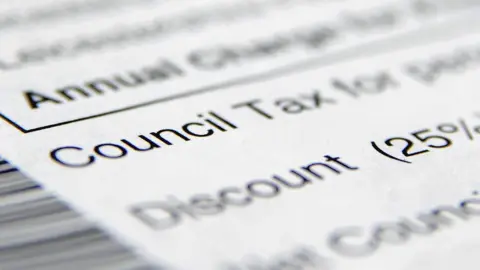Poorest households could miss out on £150 council tax rebate
 PA Media
PA MediaPeople living in some of England's poorest households and those who rent could miss out on the government's £150 council tax rebate.
Resolution Foundation figures show one in eight low-income households do not sit within eligible council tax bands.
Those with landlords responsible for council tax payments are also unlikely to receive the cost-of-living payment.
The government says it has given extra money to councils to help those on low incomes living in higher band homes.
The rebate was announced by Chancellor Rishi Sunak in February to ease the impact of soaring energy bills.
Levelling Up Secretary Michael Gove said the £3bn measure would help ease pressure as inflation rises.
It will apply from April to homes in council tax bands A to D, benefiting in the region of 80% of households.
Payments will be made directly by local authorities and will not need to be repaid.
However, Lindsay Judge, research director at the Resolution Foundation, said the rebate was "imperfect".
Ms Judge said: "Around 640,000 of the poorest families in England aren't eligible for automatic support, including one in five low-income families in London, while there is no way to stop landlords collecting the rebate instead of their bill-paying tenants."

Reasons low-income families can find themselves living in higher-bracket band E-H homes include family size and historical council-tax banding.
Labour MP and chairman of the Levelling-Up select committee Clive Betts wrote to Mr Gove to urge him to "get a grip" on the system.
The Labour MP said the minister needed to "give clear guidance to councils so that this rebate is delivered to households reliably and effectively".
In his reply, Mr Gove said people on low incomes in council tax bands E-H can access support from their local council's discretionary funds.
In last week's Spring Statement Rishi Sunak promised the government would "stand by" families struggling with the cost of living.
Measures introduced included offering councils an additional £500m for the Household Support Fund, designed to help vulnerable households with rising living costs.
The greatest proportion of low-income households not eligible for automatic support are found in the South East, with households in London twice as likely as to miss out when compared to those in the North West.
The Resolution Foundation - an independent think-tank focused on improving living standards for those on low to middle incomes - also pointed out that the rebate was not available for students or tenants with landlords responsible for council tax payments.

Who else could miss out?
As well as those in ineligible properties, households who do not pay council tax via direct debit will not automatically receive the £150 rebate.
According to the Local Democratic Reporting Service, this could impact almost half a million people in Greater Manchester.
Elsewhere:
- 323,000 households in County Durham and Northumberland may have to apply for the rebate.
- Up to 100,000 households are eligible for the rebate in Derby.
- Almost 50,000 households in Wakefield are at risk of missing out on the rebate.
- In Dorset, 130,000 households qualify for the rebate.

A spokesperson from the Department for Levelling Up, Housing and Communities said: "Direct debit is the quickest and easiest way to pay council tax, and the best way for most people to get the rebate.
"Eligible households who don't pay their council tax by direct debit will be invited to make a claim.
"Councils will be reimbursed for their administration costs."